Recent Articles
Popular Makes
Body Types
10 Cheap Electric Cars
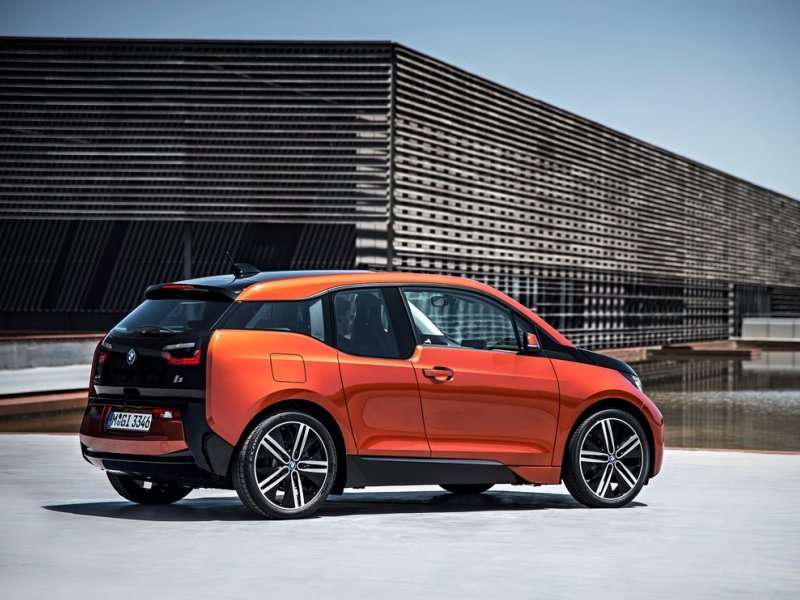
Cheap is a relative term when it comes to discussing electric cars. Most electric models have window stickers that are higher than their gas-only counterparts, due to the fact that the technologies involved in their development and production are far from inexpensive. Fortunately, most electric cars qualify for a federal tax credit of $7,500, which for most buyers makes the vehicles much more affordable. Adding on available state tax credits can even push the total rebate past the $10,000 mark, which is why we set the price ceiling for our list of cheap electric cars at $50,000.
Let's take a quick look at 10 cheap electric cars - the ones with monthly payments that the average Joe or Jane can afford. Note - not all of these vehicles are currently available in every state.
Cheap Electric Cars - 01 - 2013 Chevrolet Volt
The 2013 Chevrolet Volt starts at an MSRP of $39,145, and it qualifies for the $7,500 federal tax credit associated with electric vehicles. The Chevrolet Volt has become the face of electric cars for many shoppers, despite the fact that it features a range-extending gas engine that functions as a generator to add 300 miles to the vehicle's roughly 50-mile battery-only range. The Volt is notable for its roomy interior, its slick looks, and the excellent power offered by its 149 horse electric motor (a unit which also produces a respectable 273 lb-ft of torque).
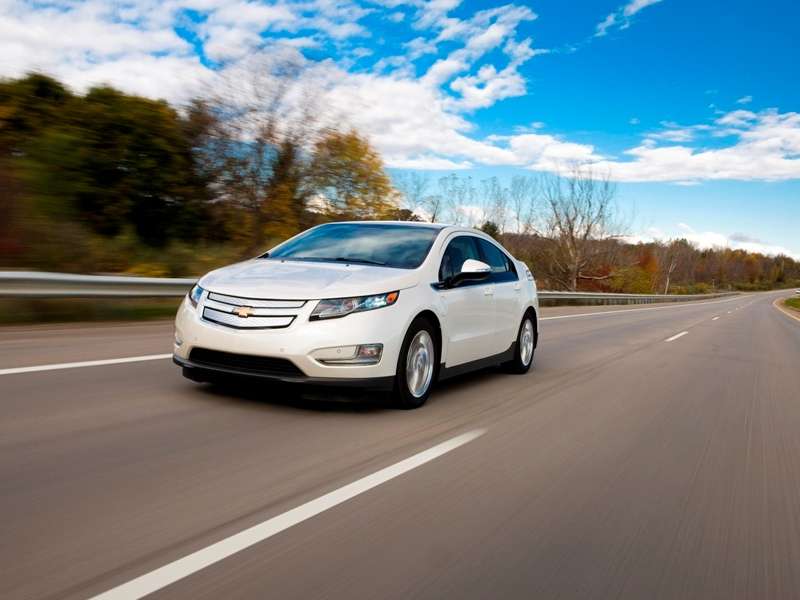
Cheap Electric Cars - 02 - 2014 Ford Focus Electric
The 2013 Ford Focus EV offers much of the practicality of the gas-powered Focus hatchback with the bonus of a zero-emissions drivetrain. Although the Ford Focus Electric loses some of its trunk space to the vehicle's battery pack, it does deliver a range of 76 miles on a single charge. It takes about four hours to recharge the Focus Electric using the company's 240-v charger, and the car offers 143 horsepower. Acceleration isn't blazing, but the Ford still manages to capture the fun flavor of the Focus' chassis, even in electric form, all for an MSRP of $35,200. Like the Volt, the Focus Electric qualifies for the $7,500 federal tax credit.
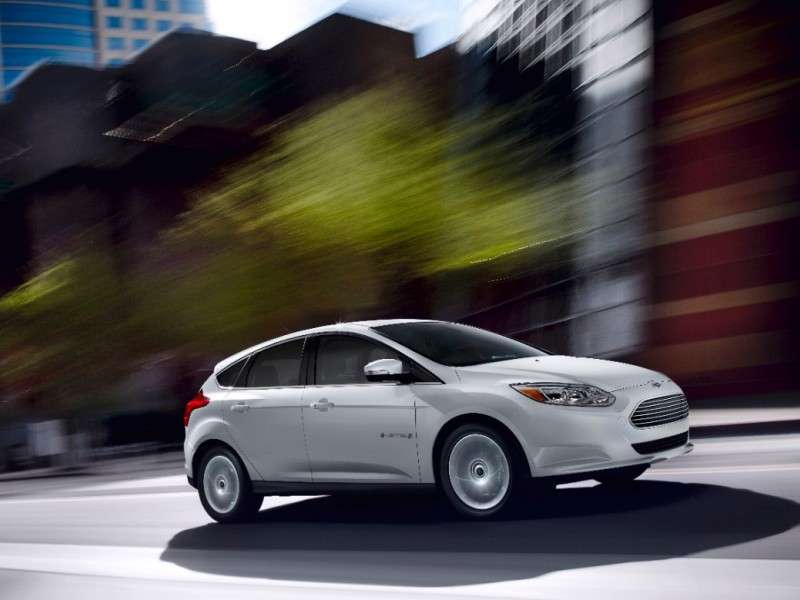
Cheap Electric Cars - 03 - 2012 Mitsubishi i-MiEV
Mitsubishi hasn't actually imported any of its 2013 model year Mitsubishi i-MiEV hatchbacks yet, but it's still possible to snag a 2012 edition of the car if you search carefully across the country. The 2012 Mitsubishi i-MiEV is perhaps the most 'golf cart-like' electric car available as a mass produced model, but its $29,125 sales price, combined with the $7,500 federal tax credit, makes it one of the cheaper electric cars to buy. Range for the fully-charged i-MiEV is listed at 62 miles, and the car (which provides tight seating for four) generates 66 horsepower and 145 lb-ft of torque from its electric motor.
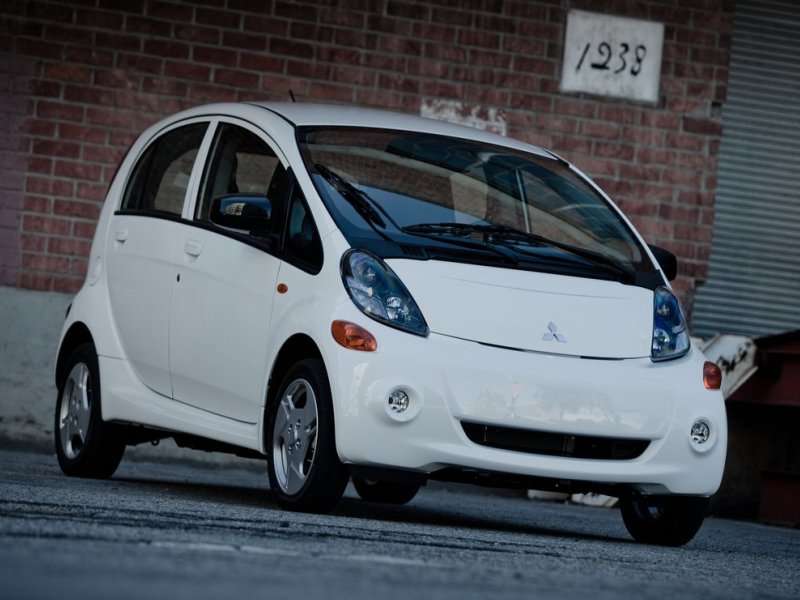
Cheap Electric Cars - 04 - 2013 Fiat 500e
The 2013 FIAT 500e takes the sexy lines of the gas-powered FIAT 500 hatchback and replaces the car's innards with an electric engine that is a good fit for the car's urban runabout mission statement. Already cramped before receiving its battery pack, the 2013 Fiat 500e becomes essentially a two-seater after its conversion to cheap electric car status, but that shouldn't both most buyers keen on forking over its $31,800 MSRP (minus the $7,500 federal tax credit). With 87 miles of range, the ability to recharge its battery in under four hours, and the kind of exciting image that isn't all that common in the electric car segment, the Fiat 500e is quite capable of distracting drivers from its lack of practicality. The car comes with 11 horsepower and 147 lb-ft of torque, plus a unique program that gives access to a fleet of rental vehicles 12 days a year if they need a car with more interior space or the ability to travel longer distances.

Cheap Electric Cars - 05 - 2014 BMW i3
We know what you are thinking: a BMW in a list of cheap electric cars? Actually, the 2014 BMW i3 isn't the most expensive model to be found on the sub-$50k electric vehicle market, as entry-level models are priced at $41,350 and qualify for the $7,500 federal tax credit. The subcompact BMW i3 hatchback features an 80 mile range and an electric engine that pushes out 170 horsepower and 184 lb-ft torque - figures that are good enough to boost it to 60-mph from a standing start in just seven seconds, which is much faster than most other electric models. Charging takes about three hours using the standard home system, while a special charger can top up the car's battery as quickly as 30 minutes after the vehicle is plugged in.
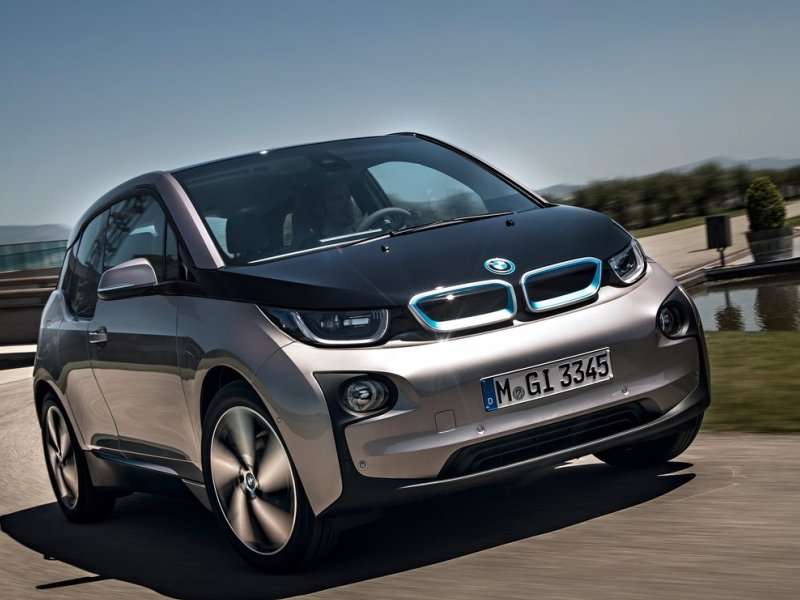
Photo by BMW
Cheap Electric Cars - 06 - 2013 Nissan Leaf
The 2013 Nissan LEAF, like the Volt, is a pioneer of the real-world cheap electric car movement. The Nissan Leaf is a economy-oriented subcompact hatchback, and although its styling might not set any hearts on fire its MSRP of just $28,800 (plus the savings associated with its $7,500 federal tax credit) attracts those who want to cruise gas-free on a budget. The Leaf is outfitted with a 107 horsepower electric motor that is also capable of producing 187 lb-ft of torque, and it can be outfitted with a special charging system that lets its battery suck up to 80 percent of its capacity from a high capacity station in a quick half hour. Total range for the fully-juiced Nissan is 75 miles.
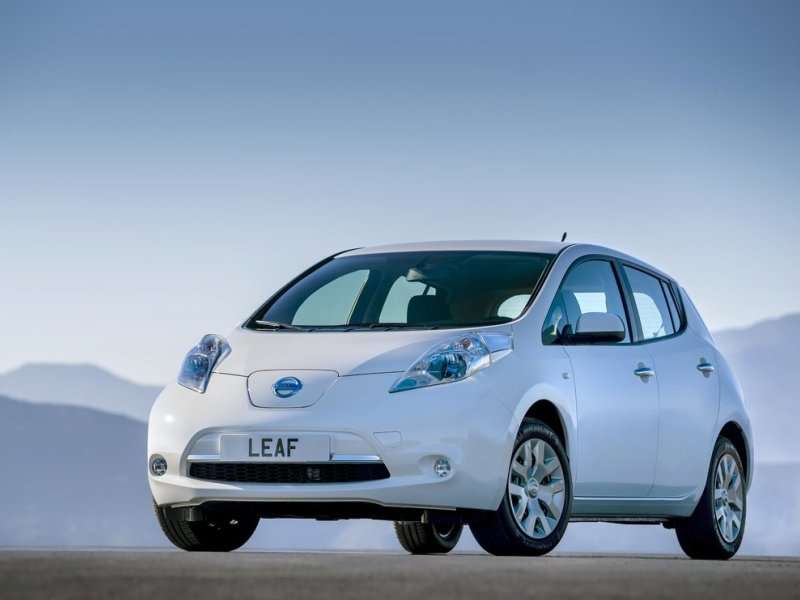
Cheap Electric Cars - 07 - 2014 Chevrolet Spark EV
The 2014 Chevrolet Spark EV is another cheap electric car newcomer, one that borrows the shell of the gas-powered Spark city car and significantly ups its performance. The secret behind the Chevrolet Spark EV's fun-to-drive persona is a high-torque electric motor, one that also churns out 130 horsepower. The Spark EV can match the BMW's sprint to 60-mph off of the line, and charging rates start at 20 minutes (for 80 percent capacity using a special charger) and move up to 7 hours for a standard 240-v outlet. The Chevrolet's starting MSRP shows as $27,495, and the car qualifies for the $7,500 federal tax credit. Total range for the Spark EV is advertised at 82 miles.
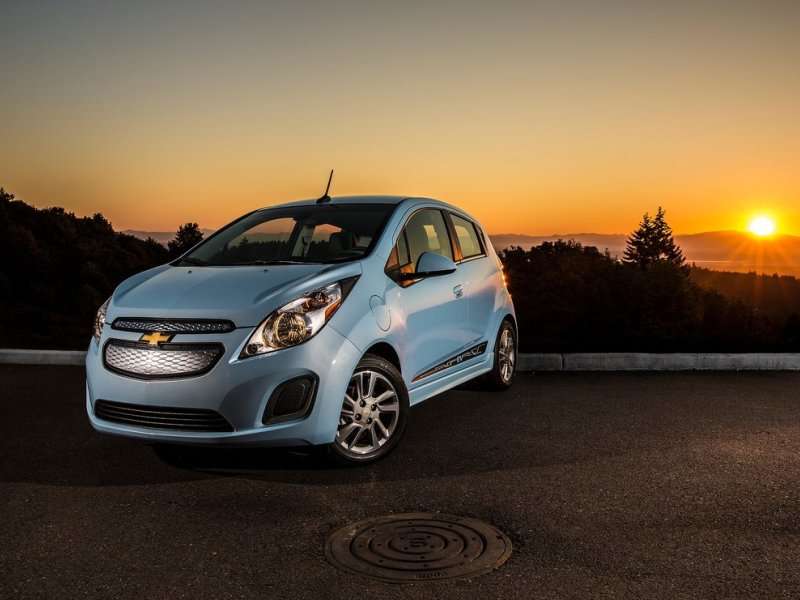
Cheap Electric Cars - 08 - 2013 Smart Electric Drive
The 2013 Smart Electric Drive is an effort from the boutique automaker to see if adding battery power to its fortwo coupe will stimulate lackluster sales. Starting at $25,000 (and eligible for $7,500 in federal tax credits), the Smart Electric Drive can also be had in convertible form, which makes it the only drop top on our list of cheap electric cars. 70 horsepower and 96 lb-ft of torque are on hand to motivate the relatively lightweight Smart car, and its 87 mile range makes it better suited to city, rather than highway duty. Very few of these cars have so far been sold, which makes them attractive to those who want take home one of the most novel electric vehicles available.
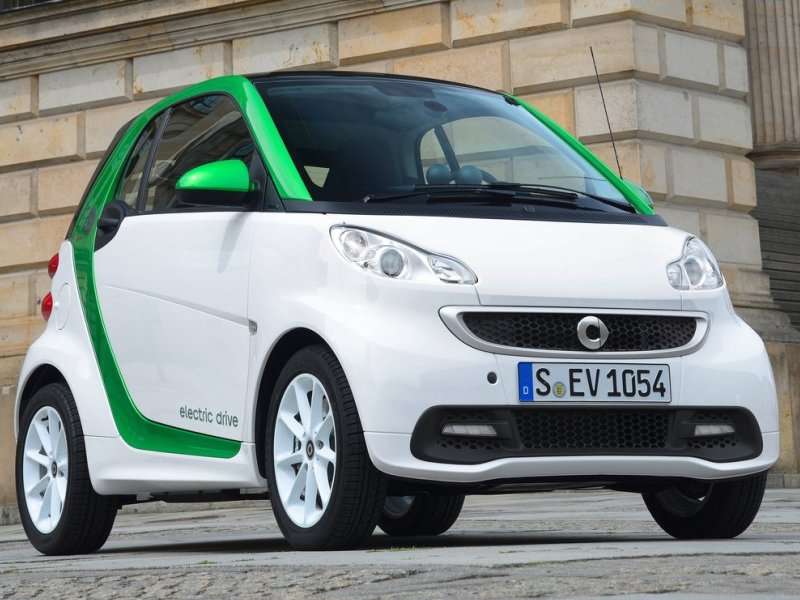
Cheap Electric Cars - 09 - 2013 Honda Fit EV
The 2013 Honda Fit EV loses the Magic Seat feature that makes the gas-powered Fit such a practical subcompact hatchback (due to battery placement), but there is still a lot to like about this cheap electric car. The Honda Fit EV remains spacious inside despite its small exterior dimensions, and the car is also quicker than the standard Fit thanks to the 123 horsepower and 189 lb-ft of torque produced by its electric motor. Fully charged, the Fit EV can travel 82 miles before it needs to be plugged in again (a process that takes about three hours using a 240-v outlet). Honda is charging $36,625 for the Fit EV, minus the $7,500 federal tax credit.
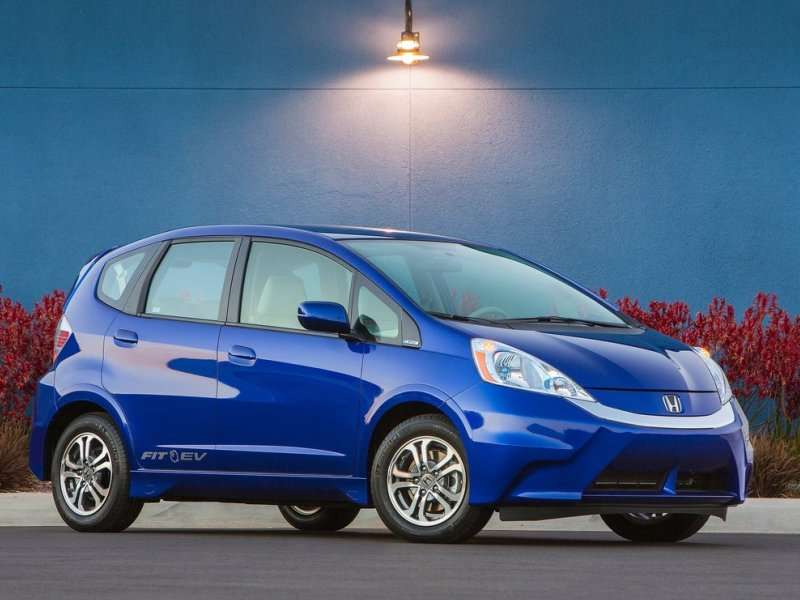
Cheap Electric Cars - 01 - 2013 Toyota RAV4 EV
The 2013 Toyota Rav4 EV boasts the highest price tag on our list of cheap electric cars: $49,800. Although the $7,500 federal tax rebate takes a bit out of that MSRP, it's still stretching the limits of what could be considered 'cheap' for electric car shoppers. The Toyota RAV4 EV matches much of the functionality of the gas version of this compact SUV, with a smooth ride, useful interior, and comfort-oriented list of standard features. The RAV4 EV's electric motor produces 154 horsepower and 273 lb-ft of torque, and it can travel an impressive 103 miles on a single charge.
